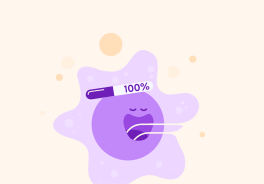YOU ARE LEARNING:
Aerobic and Anaerobic Respiration

Aerobic and Anaerobic Respiration
The difference between aerobic and anaerobic respiration is defined by the presence of oxygen.
There are two types of respiration: Aerobic and anaerobic.
We start with aerobic respiration. The formula is: glucose+oxygen→CO2+water What defines aerobic respiration?

Aerobic respiration makes a lot of energy. How many ATP molecules do you think are generated from a single glucose molecule?

What are the products of aerobic respiration? Pick all the options you think are correct.

You can select multiple answers
Which of the following are required for aerobic respiration? You can select multiple answers.

You can select multiple answers
Aerobic respiration requires oxygen and generates a lot of energy. In fact, it generates 38 ATP molecules for every glucose molecule! This is the general formula in word form glucose+oxygen→carbon dioxide+water and in chemical form C6H12O6+O2→CO2+H2O
Now we will take a look at anaerobic **** respiration. What do you think defines anaerobic respiration, compared to aerobic respiration?

Anaerobic respiration uses one of the same reactants as aerobic respiration. Which one?

Anaerobic respiration in animals is like a backup system, which is only used when there is not enough oxygen. What do you think we can say about the amount of energy produced?

To release maximum amounts of energy, glucose has to be oxidised. The lack of oxygen in anaerobic respiration makes it much less efficient at generating energy than aerobic respiration. It is therefore only a backup system that the body resorts to when there is not enough oxygen around.
In animals, anaerobic respiration has the following formula: glucose→lactice acid. You might have felt the effects of lactic acids during workouts. Where does anaerobic respiration take place?

Plant and yeast cells have a different type of anaerobic respiration to animals. Which formula shows anaerobic respiration in plants and yeast?

Anaerobic respiration in plants and yeast is called fermentation. In which processes is fermentation used? Pick all the options you think are correct.

You can select multiple answers
Anaerobic respiration requires no oxygen, and it produces much less energy, compared to aerobic respiration. In animals, the reaction is glucose→lacticacid and takes place in muscle cells. In plants and yeast, the reaction isglucose→ethanol+carbondioxide, which we call fermentation. Fermentation is used in the process of making bread and alcoholic drinks.
